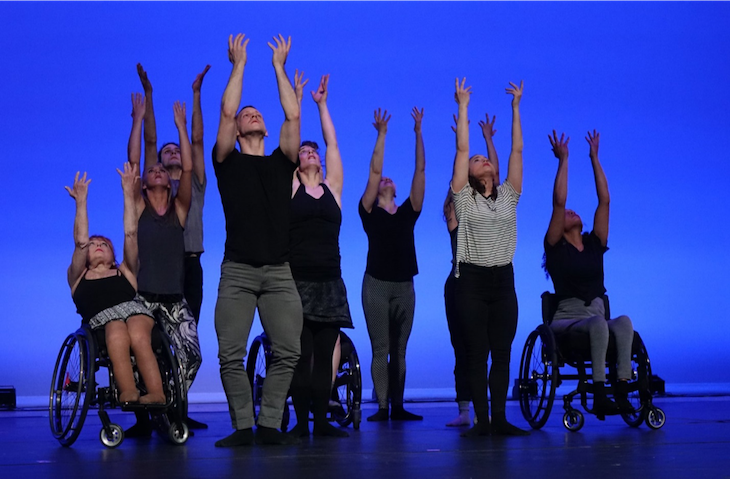“Disability does not mean inability,” is what Mary Verdi-Fletcher, one of the first and foremost professional wheelchair dancers, hopes an audience understands when they see a performance of Dancing Wheels, the world’s first physically integrated professional dance company. Verdi-Fletcher founded the Dancing Wheels Company in 1980 and has served as president, artistic director and dancer ever since. Today, the company of 10 dancers, both with and without disabilities, tours worldwide advocating for disability awareness while entertaining thousands of people each year with a repertoire of almost 70 works spanning a variety of dance styles.
Seeing a need for accessibility in the arts and dance, Dancing Wheels opened a world-class training center for dancers, choreographers and educators in 1990. From training professionals to offering K-12th grade programs, the Cleveland-based organization provides opportunities for everyone to experience dance and movement in an adaptive and inclusive way.
Verdi-Fletcher explains, “We open our arms to anyone who wants to come to our studios or be a part of our programming.” We asked Mary Verdi-Fletcher to discuss her journey to becoming a dancer, how Dancing Wheels Company & School promotes equality and inclusion, and what still needs to be done to break the stigma often associated with individuals who have disabilities:
Can you speak about your background in dance?
Mary Verdi-Fletcher: I’m the first professional wheelchair dancer in America, and I’m proud to be doing this now for almost 40 years. When I was young, I wanted to emulate my mother who was a professional dancer, but being born with a disability was a challenge. Every time I told somebody that I wanted to grow up to be a dancer, they thought it was out of reach for someone with a disability. But I kept that desire, and in my early twenties, I experimented dancing with some non-disabled partners and found that the combination of wheels and feet created a very unique style of dance. We entered a national competition, and people were astounded at what they saw. Later, I studied in The School of Cleveland Ballet, and I’ve worked with many choreographers throughout the country and across the world.
How has Dancing Wheels’ approach to physical integration influenced other dance companies?
Dancing Wheels has influenced the development of companies throughout the world. We were the first professional integrated dance company, and we helped foster companies such as Infinity Dance in New York City, Dance>Detour in Chicago and many others. Dancing Wheels was the beginning of others seeing it was possible, and now more dance companies see that a physically integrated company can perform a wide depth and breadth of styles.
One aspect of your mission is to erase negative stereotypes about people with disabilities in the arts. How do you accomplish this goal?
I think that seeing is believing. People are raised with negative perceptions and stereotypes about a lot of things like age, gender, ethnicity and so on. We’re not just geared toward artists with disabilities. Our dance company is now integrated with different ages, genders and ethnicities so we really represent inclusivity in many ways. When people see the strength and diversity of the company, they get that we are equal – not only artistically but as human beings.
How do you embed lessons about equality and inclusivity into your classes for youth?
We serve nearly 7,000 kids a year throughout Cuyahoga, Lake, Geauga and Summit counties through our outreach and educational programs. What we like to do is take our existing repertoire, a piece for instance that has a theme about equality or perhaps anti-bullying, and we extend those pieces and write residences around those topics. Children who participate get to learn about disabilities and learn that even though they may be different from one another, they are similar in some ways as well. That difference is something positive for them, and we don’t all have to look the same to contribute to our society.
This year, Ali Stroker became the first wheelchair user to win a Tony Award. What did that recognition of an artist with a disability mean to you?
I was ecstatic to see Ali win! I think that beyond her being an individual with a disability who uses a wheelchair, rising up to acquire that award means not only that she is extremely talented, but she put in a lot of hard work. It shows that whether you have a disability or not, those are the elements required to be successful in whatever you do.
Can you speak about the relationship Dancing Wheels has with the Cleveland Foundation?
The Cleveland Foundation has been wonderfully supportive for many years. And that support started back in the days where we had a lot of work to do for people in the community to realize our status and importance in society, but the Cleveland Foundation understood what we were working to do and helped support us in that effort.
They have also been very instrumental in special projects. For instance, when we were forced to move out of the space we had for 20 years, the foundation provided one of the largest contributions that helped us relocate. This got the ball rolling to gain support from the community in-general during the moving process.
Support Dancing Wheels School & Company here!
Stay tuned for more “Stories of Impact” in our community throughout 2019 featuring Cleveland Foundation partners and grant-funded nonprofit organizations. Looking to donate to a specific field of interest or begin your own fund to support causes you care about? Visit: www.ClevelandFoundation.org/Give.



